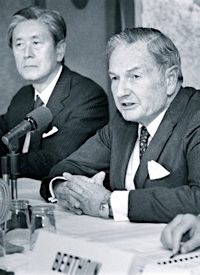
Launched in 1973, the Trilateral Commission (TC) listed an initial roster of 187 members, all of whom hailed from three areas: Western Europe, North America, and Japan (hence the name Tri-lateral).
Today, the revamped European Group has members from 25 countries, many once part of the Soviet bloc. The North American Group whose members originally came from only Canada and the U.S. now has several from Mexico. And what was once solely a Japanese portion has been re-named the Asian-Pacific Group with 13 countries represented including Australia, New Zealand, India, and China. As a result of reaching out virtually worldwide, TC’s roster now lists 18 “Participants from Other Areas” such as Russia, Taiwan, Israel, Turkey, Africa, and South America. Total membership in 2010 has grown to 390, more than double the number at inception.
Labeling itself as “a non-governmental, policy-oriented discussion group,” TC claims as its purpose “to encourage understanding and closer cooperation among these three regions on shared global problems.” Its own website makes clear that the overall goal is to smooth the path toward “interdependence.” This would be accomplished through annual meetings and a stream of publications designed in part “to counteract economic and political nationalism.” In other words, TC considers interdependence good and any form of nationalism bad. Anyone who scrutinizes TC’s self-description or any of its Trialogue publications will find no support for our nation’s Declaration of Independence or Constitution. It is significant that TC started with an office in mid-Manhattan but is now situated in mid-Washington, D.C., where its influence on America’s government can be wielded more efficiently.
Understanding TC can best be grasped by knowing its roots. The organization arose from Zbigniew Brzezinski’s 1970 book Between Two Ages. Many of this tome’s 300 pages supply undiluted praise for Marxism (“a victory of reason over belief,” “a major advance in man’s ability to conceptualize his relationship to his world,” and “the best available insight into contemporary reality”). A reader is then told that the United States was “undergoing a revolution [which] unmasks its obsolescence.” Hence, according to the man who became TC’s actual godfather, Marxism is good and the United States is old hat.
What to do about the situation Brzezinski described? He boldly suggested “movement toward a larger community of developed nations … through a variety of indirect ties and already developing limitations on national sovereignty.” Further, he proposed forging “community links” among Western Europe, the United States and Japan. The Columbia University professor finally got around to suggesting his overall goal: “world government.”
In 1973, David Rockefeller launched TC exactly as Brzezinski had proposed (the only exception being the addition of Canada in the North American Group). For the organization’s Director, Rockefeller unsurprisingly turned to Brzezinski. And of the 65 original TC members from the United States, 35 were members of Rockefeller’s other pro-world-government organization, the Council on Foreign Relations. Noteworthy among the original members of Rockefeller’s newest creation was then-Governor Jimmy Carter of Georgia. When Carter won election in 1976, he promptly filled his administration with TC/CFR members. Who could be surprised?
Ronald Reagan began his 1980 campaign for the GOP nomination and eventual election by targeting the “19 key members of the [Carter] administration who are or have been members of the Trilateral Commission.” His aides said he opposed placing TC members in government posts because they “were soft of defense.” But when he won the nomination in the summer of 1980, he chose Trilateral veteran George H.W. Bush as his running mate and he later selected Caspar Weinberger as his Secretary of Defense! In 1983, Mr. Reagan even reappointed TC member Paul Volcker for another term as Chairman of the Federal Reserve.
Visitors to the TC website will learn that this Rockefeller creation is “an independent organization [and] is not part of the U.S. government or any other government or the United Nations.” There also appears insistence that it “has no formal ties with the Council on Foreign Relations, the Bilderberg Group, the Brookings Institution, or any such organization, although many Commission members are associated with organizations like these.” In fact, 17 members of the Obama administration are TC members including Secretary of the Treasury Timothy Geithner, National Economic Council chief Lawrence Summers who maintains an office in the White House, Director of National Intelligence Dennis Blair, Ambassador to the United Nations Susan Rice, and Special Representative for Afghanistan and Pakistan Richard Holbrooke. All of these TC members are also CFR members.
Many more Americans have become aware of the tight grip on our nation held by TC, CFR, Bilderbergers, and other elitist groups, all of which have been begun by or financed by David Rockefeller. Our nation would be well served if all of these people were repudiated. The recommendation handed down through the ages that urges “Put none but Americans on guard” ought to be applied today. Anyone who affiliates with the likes of the Trilateral Commission and its cleverly couched preference for world government doesn’t qualify to be on guard.
Photo: Trilateral Commission Deputy Chairman from Japan Toshio Okawara, left, and North American Chairman David Rockefeller, right, during a final news briefing and summary of proceedings at the annual Trilateral Commission meeting in San Francisco on March 23, 1987: AP Images


